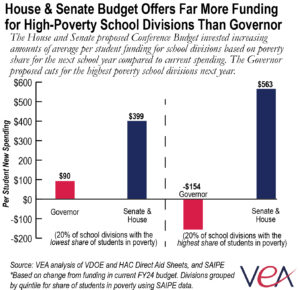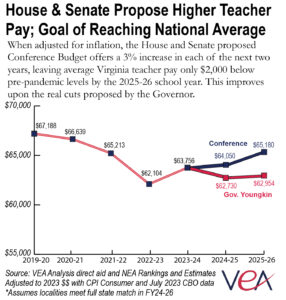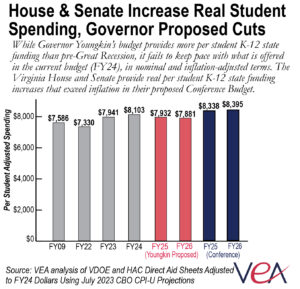VEA APPLAUDS PASSAGE OF BUDGET BILL AND INVESTMENTS IN K-12 SCHOOLS
March 11, 2024
March 11, 2024
The 2024 General Assembly came to an end on Saturday, but not before the House and Senate, in a show of bipartisanship, passed the 2024-2026 Biennium budget. Overall, the budget goes far beyond what the Governor offered, appropriating more than a billion dollars for K-12 schools over the next two years. Lawmakers were able to reverse all of the regressive tax policy choices proposed by Governor Youngkin, which prioritized large tax giveaways to the wealthy over adequately funding our local schools. In addition, for the first time ever, after decades of soft pledges from various lawmakers on both sides of the aisle, House and Senate Democratic leadership put forth a budget with the plan to get Virginia to the national teacher pay average over the next four years.
 In response to the release of the proposed Conference Budget today, Dr. James Fedderman, President of the Virginia Education Association said: “Today, leaders in the House and Senate delivered a pro-education budget that Virginians can be proud of. Leaders prioritized key funding to seriously address our teacher shortages, and support for students who face the most barriers, and English learner students, who have been neglected by the state for far too long. By prioritizing the modernization of our revenue code, rather than tax giveaways to the wealthy, as the Governor proposed, leaders were able to make the type of investments that will improve services and support for students in every classroom throughout the Commonwealth. We now look to the governor to sign this pro-education budget and choose kids over corporations and his wealthy friends.”
In response to the release of the proposed Conference Budget today, Dr. James Fedderman, President of the Virginia Education Association said: “Today, leaders in the House and Senate delivered a pro-education budget that Virginians can be proud of. Leaders prioritized key funding to seriously address our teacher shortages, and support for students who face the most barriers, and English learner students, who have been neglected by the state for far too long. By prioritizing the modernization of our revenue code, rather than tax giveaways to the wealthy, as the Governor proposed, leaders were able to make the type of investments that will improve services and support for students in every classroom throughout the Commonwealth. We now look to the governor to sign this pro-education budget and choose kids over corporations and his wealthy friends.”
Below, we detail some of the most significant K-12 changes proposed in the chamber budgets.
Pathway to the National Teacher Pay Average for the First Time Ever
The Conference Budget includes funding for a 3% pay increase for state-supported school employees over each of the next two years. In addition, Democratic leadership has promised to get Virginia teachers to the national teacher pay average by the 2027-28 school year, which would be funded in the next full state budget proposed in December 2026. The state of Virginia has never paid at the national teacher pay average, despite decades of promises from lawmakers. Having leaders of both appropriation committees promising to get to the national teacher pay average in the next state budget is meaningful and historic.
Unlike the Governor’s proposed budget, the Conference Budget keeps up with inflation and even exceeds it in the second year. This is a major improvement from the effective pay cuts proposed by Governor Youngkin and will get Virginia on track to get beyond our pre-pandemic average teacher pay levels and to the national average in the next budget cycle.

Many Shortchanging Gimmicks from Governor’s Budget Removed
The Conference Budget unwinds many of the most egregious gimmicks in Governor Youngkin’s budget that shortchanged our schools. This budget restores the promised funding to hold divisions harmless for reductions in the grocery tax made in the previous state budget (+$243M). Governor Youngkin promised to include this funding in his budget but reneged and thought the public wouldn’t notice.
Unfortunately, the Conference Budget failed to replace $388 million that Governor Youngkin supplanted in his proposed budget. This budget gimmick penalizes local schools dollar for dollar for the money they received in the last round of federal pandemic aid. It also shortchanges high-poverty schools the most over the next two years.
Support Cap
Like the Governor’s proposed budget, the Conference Budget does not lift the arbitrary cap on school support staff, which was implemented as a cost-saving measure during the Great Recession and has resulted in the loss of billions of dollars in state support to our local school divisions over time – known as the “Support Cap.” Fully lifting the support cap has been a goal of education advocates for years and was a recommendation in last summer’s JLARC report (which showed Virginia was severely underfunding education).
Significant Investments Made to Support Students Facing Most Barriers
The Conference Budget included a historic investment in tiered support for English learner students based on English proficiency levels (+$72M). English learner students lost the most ground of any student group the state measures since the start of the pandemic and the state has failed for the past three budgets to make any new investments in this student population. Virginia has been near the very bottom tier for state supplemental support for English learner students and the investment from this budget will move us much closer to, but still below, the average.
The Conference Budget also made a significant investment of $371 million in updating the state At-Risk Add-On, using parts of the methodology proposed by JLARC for better funding students identified as “economically disadvantaged.” This budget also made a technical adjustment to the new proxy measure for student poverty to ensure that communities with a high-share of immigrant families are not unfairly penalized.

While the Conference Budget adopted Governor Youngkin’s proposal to modernize our tax code with a digital sales tax for consumers, as 38 other states have already done, it also didn’t fully exclude businesses from paying the same tax consumers will pay, as Governor Youngkin proposed. Governor Youngkin’s proposal to exclude businesses from the digital business tax was highly unusual, and only 1 of the 38 states with a digital sales tax has chosen to do this (Iowa). The decision in the Conference Budget to modernize our tax code in line with the majority of other states, including all of Virginia’s neighboring states, raises around $1 billion over the biennium and allowed leaders in the General Assembly to invest significantly more K-12 funding, which is in line with the priorities supported by Virginians.
“In November, Virginians delivered our renewed and new Democratic majorities a clear mandate to provide a check on Governor Youngkin’s out-of-step agenda. We began this session articulating our priorities to safeguard women’s reproductive rights, foster safe communities through common-sense gun violence prevention measures, protecting Virginians’ right to vote, building an economy that benefits every Virginian, and guaranteeing our children’s futures with access to a world-class education. This session, we are honored to have not only met but exceeded these expectations.
The enactment of the 2024-2026 Biennium budget marks not just a milestone but the dawn of an unwavering dedication to pivotal matters at heart. We stand in ovation and in support for the exemplary efforts of Chair of the Senate Finance and Appropriations, L. Louise Lucas, whose fierce advocacy has engineered a budget that champions the needs of everyday Virginians—a stark contrast to Governor Youngkin’s proposal, which solely caters to a select elite. This budget is a mirror to the progressive strides Virginians yearn for, placing a spotlight on education rather than tax cuts, thereby channeling significant investments into our youth rather than affording tax relief to the affluent. It underscores our enduring pledge to the health and early development of every Virginian, with substantial investments that broaden healthcare access and fortify early childhood education. This document is more than a budget; it’s a testament to our collective vision for a more equitable and thriving Virginia.
We take pride in having delivered on our promises to the electorate. The Senate Democrats are dedicated to serving all Virginians and pledge to continue governing with accountability and foresight.”
YEAS–Aird, Bagby, Boysko, Carroll Foy, Deeds, Ebbin, Favola, Hackworth, Hashmi, Locke, Lucas, Marsden, McPike, Pekarsky, Perry, Pillion, Roem, Rouse, Salim, Stuart, Subramanyam, Surovell, VanValkenburg, Williams Graves–24.
NAYS–Craig, DeSteph, Diggs, Durant, French, Head, Jordan, McDougle, McGuire, Mulchi, Obenshain, Peake, Sturtevant, Suetterlein–14.
RULE 36–0.
NOT VOTING–Reeves, Stanley–2.
YEAS–Anthony, Askew, Austin, Bennett-Parker, Bloxom, Bulova, Callsen, Campbell, Carr, Clark, Cohen, Cole, Convirs-Fowler, Cousins, Coyner, Delaney, Feggans, Gardner, Glass, Hayes, Helmer, Henson, Hernandez, Herring, Hope, Jones, Keys-Gamarra, Kilgore, Krizek, Laufer, LeVere Bolling, Lopez, Maldonado, Marshall, Martinez, McClure, McQuinn, Morefield, Mundon King, Price, Rasoul, Reaser, Reid, Seibold, Sewell, Shin, Sickles, Simon, Simonds, Srinivasan, Sullivan, Tata, Taylor, Thomas, Torian, Tran, Ward, Watts, Wiley, Willett, Wyatt, Mr. Speaker–62.
NAYS–Arnold, Ballard, Batten, Cherry, Cordoza, Davis, Earley, Ennis, Fowler, Freitas, Garrett, Gilbert, Green, Griffin, Higgins, Kent, Knight, Leftwich, Lovejoy, McNamara, Milde, Oates, Obenshain, O’Quinn, Orrock, Owen, Phillips, Runion, Scott, P.A., Wachsmann, Walker, Ware, Webert, Williams, Wilt, Wright, Zehr–37.
ABSTENTIONS–0.
NOT VOTING–Hodges–1.
Teacher shortages are a serious issue across the country. Here in Virginia, there are currently over 3,648 unfilled teaching positions. (FY23)
Learn More